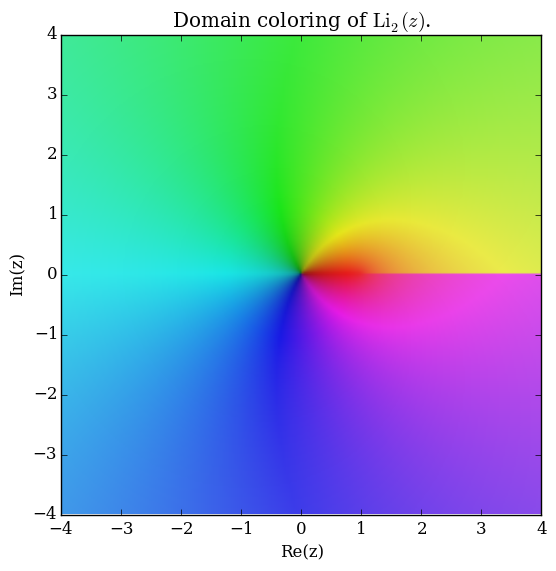Difference between revisions of "Dilogarithm"
From specialfunctionswiki
(→Properties) |
|||
| Line 15: | Line 15: | ||
[[Relationship between Li 2(-1/x),Li 2(-x),Li 2(-1), and log^2(x)]]<br /> | [[Relationship between Li 2(-1/x),Li 2(-x),Li 2(-1), and log^2(x)]]<br /> | ||
[[Derivative of Li 2(-1/x)]]<br /> | [[Derivative of Li 2(-1/x)]]<br /> | ||
| + | [[Li2(z)=zPhi(z,2,1)]]<br /> | ||
=References= | =References= | ||
Revision as of 03:03, 25 June 2017
The dilogarithm function $\mathrm{Li}_2$ is defined for $|z| \leq 1$ by $$\mathrm{Li}_2(z)=\displaystyle\sum_{k=1}^{\infty} \dfrac{z^k}{k^2},$$ which is a special case of the polylogarithm.
Domain coloring of $\mathrm{Li}_2$.
Properties
Relationship between dilogarithm and log(1-z)/z
Relationship between Li 2(1),Li 2(-1), and pi
Li 2(1)=pi^2/6
Relationship between Li 2(-1/x),Li 2(-x),Li 2(-1), and log^2(x)
Derivative of Li 2(-1/x)
Li2(z)=zPhi(z,2,1)
References
- 1953: Harry Bateman: Higher Transcendental Functions Volume I ... (previous) ... (next): $\S 1.11.1 (22)$
- 1958: Leonard Lewin: Dilogarithms and Associated Functions ... (next): $(1.1)$
- 1981: Leonard Lewin: Polylogarithms and Associated Functions (2nd ed.) ... (next): $(1.1)$
- 1991: Leonard Lewin: Structural Properties of Polylogarithms ... (next): $(1.1)$
